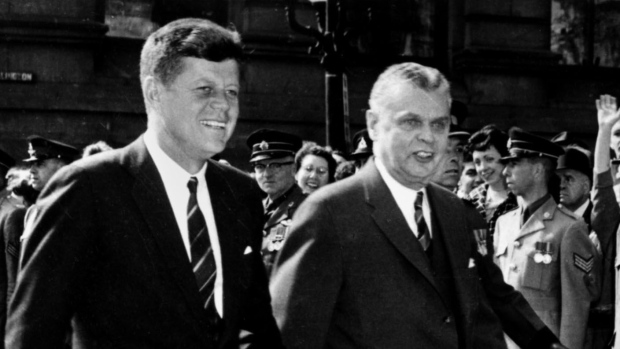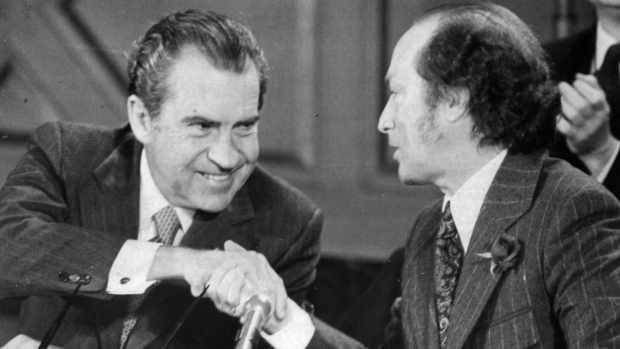Jan 19, 2017
Friends or frenemies: When prime ministers and presidents clash
Former Prime Minister Brian Mulroney says good things happen when Canada’s prime minister and the president of the United States are friends. But that hasn’t always been the case. In fact, for two countries with such close political and economic ties, relations between leaders of our two countries have been downright frosty at times.
It’s been that way since the start. U.S. President Ulysses S. Grant wanted to do to Canada what he did to the South during the civil war. So angered by a fishery dispute with Prime Minister John A. MacDonald in 1870, he told his cabinet he wanted “to take Canada and wipe out her commerce.”
Arguing against closer trade relations with the United States, MacDonald said “a British subject I was born—a British subject I will die. With my utmost effort, with my latest breath, will I oppose the ‘veiled treason’ which attempts by sordid means and mercenary proffers to lure our people from their allegiance."
A U.S. president didn’t set foot on Canadian soil until Franklin D. Roosevelt visited Montreal in 1936. Relations between Canadian and U.S. leaders were close during the Second World War and the immediate post-war era. However, the friendship began to deteriorate with the election of John F. Kennedy.
In an address to Canada’s parliament in 1961, Kennedy described the Canada-U.S. relationship in glowing terms. “Geography has made us neighbours. History has made us friends. Economics has made us partners. And necessity has made us allies. Those whom nature hath so joined together, let no man put asunder. What unites us is far greater than what divides us.”

But, in private, Canadian Prime Minister John Diefenbaker hated the popular president. The two men clashed on the issue of continental defense and Diefenbaker called Kennedy a “boastful young son of a bitch.”
Things got even worse with Lester Pearson and Lyndon Johnson. After Pearson criticized U.S. intervention in Vietnam, Johnson reportedly grabbed Pearson by the shirt and told him he had urinated on the presidential rug… or words to that effect.
The icy-relations continued between Pierre Trudeau and Richard Nixon. Trudeau famously described living next to the United States as similar to “sleeping with an elephant” – and the elephant was not a fan of Trudeau’s close ties with Cuban President Fidel Castro.
At one point Nixon declared the unique relationship between Canada and the U.S. was dead. "It is time for us to recognize," Nixon said in a 1972 speech to Parliament, "that we have very separate identities; that we have significant differences; and that nobody's interests are furthered when these realities are obscured.”

There were few national leaders more dissimilar than Trudeau and Ronald Reagan, but Trudeau actually got along well with the conservative president. Trudeau paid a high political price at home after agreeing to Reagan’s request to allow cruise missile testing in Canada.
The friendship grew even closer with Brian Mulroney. The two men got along famously and that helped bring about the North American Free Trade Agreement. Mulroney delivered eulogies at Ronald Reagan’s funeral in 2004 and Nancy Reagan’s funeral last year.
Jean Chrétien was the first foreign leader invited to the White House when George W. Bush was elected. But after the September 11 terrorist attacks, Bush failed to even mention Canada in a speech thanking countries who had assisted in responding to the crisis.
The relationship between Bush and Chrétien chilled even more when Canada decided not to participate in the invasion of Iraq.
Years later, Barack Obama would annoy Stephen Harper with the rejection of the Keystone XL pipeline.
Canadian Prime Minister Justin Trudeau has forged a close kinship with Obama. In his introduction to Obama’s address to parliament last year Trudeau described his relationship with the Obama as a “bro-mance” and “dude-plomacy.”
Will Trudeau be able to maintain his close ties with the White House? He’s taking to Youtube with Canada’s U.S. Ambassador David McNaughton to try. “Our countries have been friends for a long time. We grew up together and have overcome many shared challenges over the course of our history,” he said in a recent video message to newly elected U.S. political leaders.
Perhaps that’s not such a bad way reach out to President-elect Donald Trump – a man known for his love of social media.